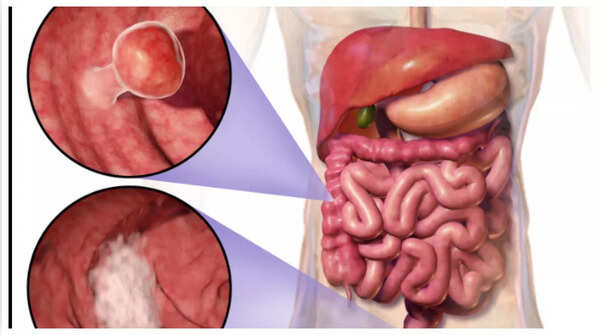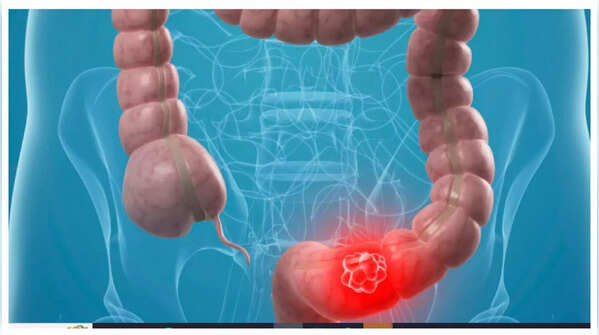Colorectal cancer, a disease affecting the colon or rectum, often begins as benign polyps that can become cancerous over time. While many cases arise spontaneously, factors like family history, obesity, and lifestyle can elevate risk. Predominantly affecting individuals over 50, initial symptoms are frequently subtle, mimicking common digestive issues. Recognizing these early warning signs is crucial. Here are five often-missed early symptoms of colon cancer.

A primary indicator of colon cancer is a change in bowel habits, which include:
These changes might seem insignificant, often attributed to diet or stress. However, persistent bowel changes lasting more than a few days or recurring frequently could signal a growing tumor disrupting normal bowel function.

The presence of blood in stool warrants immediate attention, regardless of the suspected cause. This may manifest as:
In some instances, bleeding may be imperceptible, leading to anemia over time. While various conditions, such as hemorrhoids or infections, can cause blood in the stool, ruling out colon cancer is essential, especially with recurrent occurrences or accompanying symptoms.

Persistent abdominal discomfort is another easily dismissed early symptom, potentially including:
Often mistaken for indigestion or minor digestive issues, ongoing pain unrelated to dietary or lifestyle changes could indicate a tumor causing irritation or blockage in the colon.

Unexplained and excessive tiredness or weakness can be a subtle indicator of colon cancer, particularly when coupled with other symptoms. This can result from slow, undetected bleeding in the colon, leading to iron deficiency anemia. The reduced red blood cell count impairs oxygen delivery, causing fatigue, shortness of breath, and weakness. While these symptoms can be attributed to stress or insufficient sleep, medical evaluation is advisable.

Unintentional weight loss is a common symptom across many cancers, including colon cancer. The body's fight against cancer elevates immune system activity, and tumors can disrupt digestion and appetite. Significant weight loss without changes in diet or exercise necessitates medical consultation. Although often a later-stage symptom, it can occasionally serve as an early warning sign.
Disclaimer: This information is for educational purposes only and does not substitute professional medical advice. Always seek the guidance of a healthcare provider for any health concerns.
Newer articles
Older articles
 Smith Eyes Grenada Test Return After Injury Recovery
Smith Eyes Grenada Test Return After Injury Recovery
 Google Maps Boosts Navigation Precision with Fused Orientation Provider Update
Google Maps Boosts Navigation Precision with Fused Orientation Provider Update
 Earth Sciences Minister Rijiju Expresses Frustration Over Atos Supercomputer Delay, Jeopardizing Weather Forecast Upgrades
Earth Sciences Minister Rijiju Expresses Frustration Over Atos Supercomputer Delay, Jeopardizing Weather Forecast Upgrades
 Washington Freedom Snatch Last-Ball Win Over Knight Riders in MLC Thriller; Playoff Hopes Soar
Washington Freedom Snatch Last-Ball Win Over Knight Riders in MLC Thriller; Playoff Hopes Soar
 East Africa Rift: Mantle Upwelling Drives Birth of New Ocean, Study Finds
East Africa Rift: Mantle Upwelling Drives Birth of New Ocean, Study Finds
 Colon Cancer: Don't Ignore These 5 Subtle Warning Signs
Colon Cancer: Don't Ignore These 5 Subtle Warning Signs
 Prasidh Krishna Vows to Sharpen Bowling After Costly Leeds Performance
Prasidh Krishna Vows to Sharpen Bowling After Costly Leeds Performance
 Gavaskar Urges India to Replace Thakur with Yadav for Second Test Against England
Gavaskar Urges India to Replace Thakur with Yadav for Second Test Against England
 Rishabh Pant's Unconventional Batting Style Is Revolutionizing Cricket, Says Greg Chappell
Rishabh Pant's Unconventional Batting Style Is Revolutionizing Cricket, Says Greg Chappell
 Vitamin B12 Deficiency: Cardiologist Explains Symptoms, Sources, and Why You're Always Tired
Vitamin B12 Deficiency: Cardiologist Explains Symptoms, Sources, and Why You're Always Tired